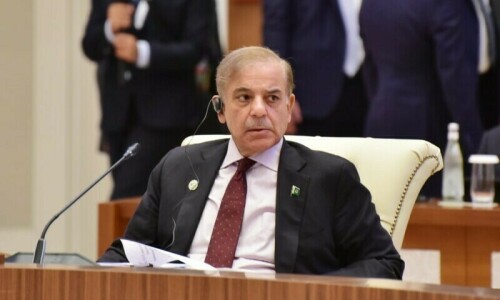RAWALPINDI, Oct 12: The World Bank fears that high food and prices may affect education of the poor children and that it was creating pressure on the parents to pull their children out of schools.
In a new report, the World Bank says there are emerging indications that children are missing schools and families cutting back on education spending due to the current food crisis. Food price increases have been the most severe in some of the poor countries where past downturns have already reduced enrolment, it says.
The report, Rising food and fuel prices: addressing the risks to future generations, says schooling imposes explicit and implicit costs on households such as fees, transportation and uniforms and when they become poorer, they may not be able to afford the costs and therefore withdraw their students from schools.
The razor thin margins between daily earnings and spending has led to households eating less, switching to cheaper coarse cereals and reducing non-food spending such as on schooling. These sacrifices can lead to irreparable damage to the health and skill levels of millions of poor people worldwide, the report says.
The report suggests that effective social protection, education, and nutrition responses are needed to ensure that rising food and fuel prices do not have lasting impacts on the human and physical capital of the poor. These responses must be based on careful country-specific diagnostics as some areas and groups within a country have been affected much more than others.
In the face of rising food and fuel prices, social protection programmes can play a key role in forestalling increases in poverty with wider developmental, social and even political benefits. By helping to prevent increases in poverty these programmes help households maintain access to food, energy, and essential services. Social safety nets can also reduce the impact of economic shocks on health and education, the report adds.
Given the urgency of the crisis, the emphasis in the short run must be on scaling up existing programmes, while avoiding measures that work against the development of a sound social protection system in the medium term.
The report says specific interventions are needed to prevent dropouts and help students who have dropped out get back into schools. Social protection and demand-side transfers can help reduce pressures to pull children out of schools by protecting household incomes and/or reducing schooling costs. Another possible intervention is to reduce or eliminate school fees, which has proven to be very effective in increasing school enrollments, according to the report.
Effective health and nutrition interventions are also needed to complement social protection programs. For countries with limited capacity and financial resources, provision of targeted food supplements and micronutrients may be the most effective short-run nutrition interventions.
A significant number of countries are mobilising policy responses to the rising food and fuel prices with a broad range of measures, but they are tilted heavily to general subsidies or tax reductions rather than targeted safety nets. The urgency of responding to the food and fuel crises has not diminished, and there is still time to improve and expand the policy response to place much greater emphasis on nutrition and social protection instruments and a large number of countries have implemented or are implementing policy responses to the double food and fuel crisis, the report says.













































Dear visitor, the comments section is undergoing an overhaul and will return soon.